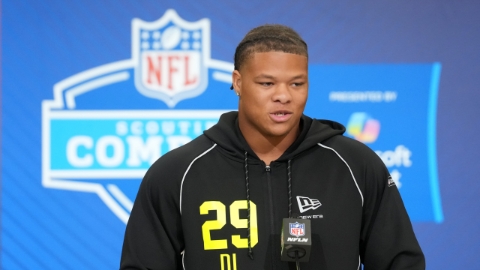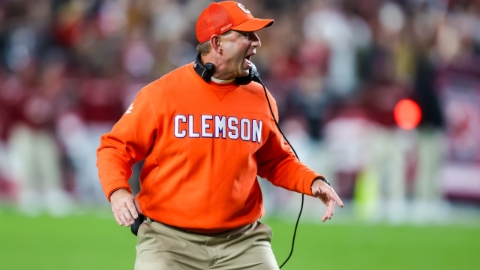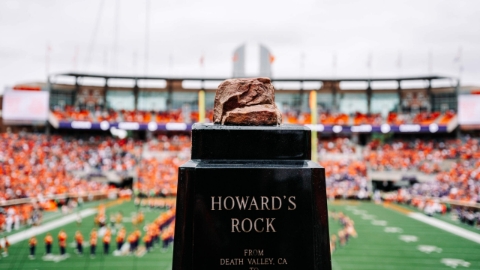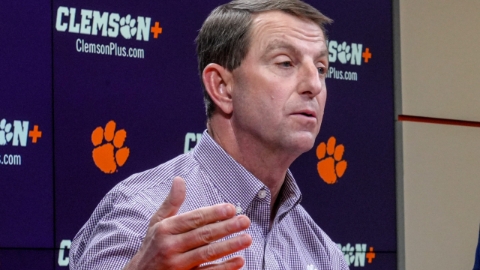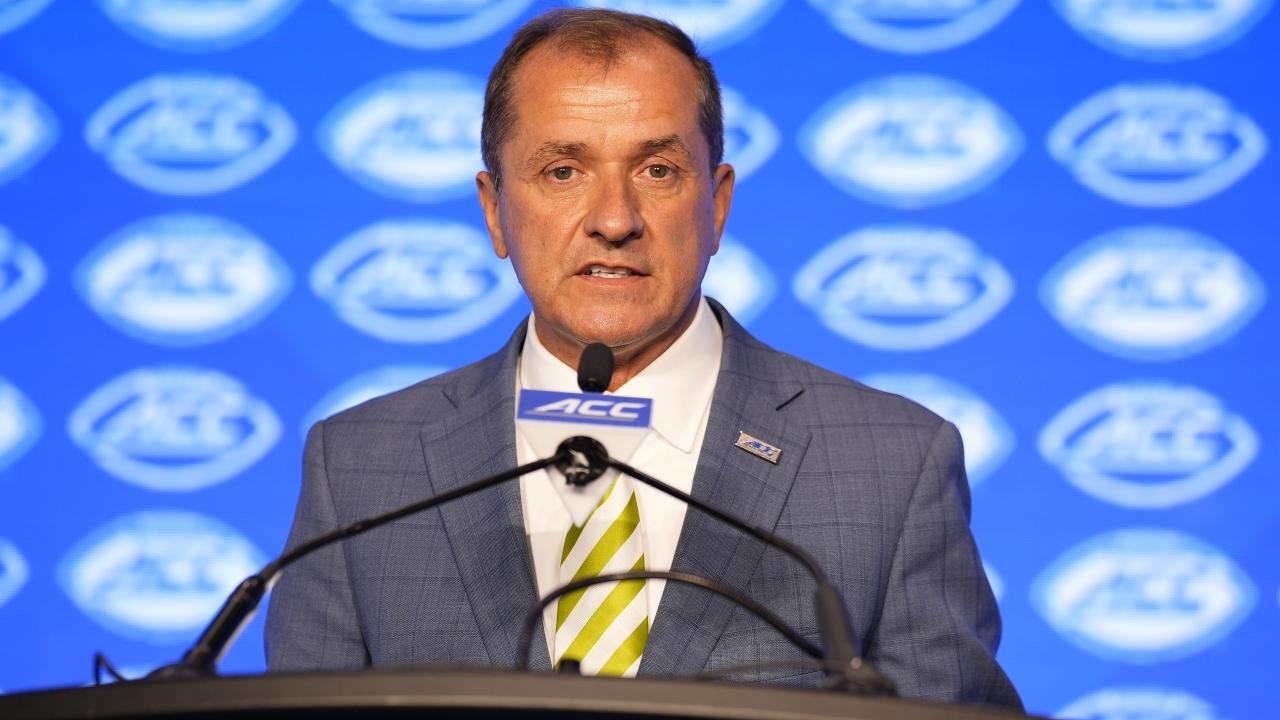
With questions about the future of the ACC, as Florida State and Clemson pursue lawsuits against the league, Commissioner Jim Phillips took questions about the state of the conference.
Q. You just talked about how the lawsuits are damaging and disruptive to the ACC. How does this not continue to become a distraction as we try to turn the focus to football?
COMMISSIONER PHILLIPS: We've had six months of disruption. I think we've handled it incredibly well.
So I think it's important for me to lead our group in particular, not only our staff but more importantly our schools, to compartmentalize the legal piece of what's happening and not let it distract us or take us away from what we're all trying to do. That is to provide great experiences for our student-athletes, teams, coaches, put the focus back on the fields and areas of competition.
But I will tell you there isn't a day that doesn't go by that I don't spend some time on the legal cases. I don't think that's going to change. We're really fortunate to have hired Pearl Houck, our first internal GC, and have great legal teams in a myriad of places.
We have proven that you have to move forward even with these types of distractions and really important issues that are part of your daily lives.
Q. You've spoken in the past about your concerns about college athletics becoming a gated community. The House settlement, as proposed, a lot of the money in that settlement is going to go to Power Five athletes; a lot of the money is coming from the NCAA from schools that don't even play football. Do you have any concerns about how that would exacerbate the divides in college athletics? Do you think the settlement is equitable?
COMMISSIONER PHILLIPS: I think another really good question.
Here is what I would say. I'll take the second part first.
It is to me equitable relative to who's playing for that, et cetera. We've all been part of this association. This idea that it's football only and should be driven by the football coaches, I do not agree with that.
I think the board of directors emphasized that they would not have signed off on that if they felt differently. There's shared pain on this.
The NCAA, I give our new president Charlie Baker a lot of credit. He's trying to take the most of it on.
As it relates to the first part of the question, I talked about that a couple years ago. I don't think everybody liked what I had to say in that particular forum. It's okay. But that has been kind of our history of being under the tent kind of together.
But you're seeing some clear separation. I think there will be choices to be made. That's what we're working through right now with this proposed settlement. There's so many steps that affect the long-term future, but you don't know what's future is going to be until you start to get into it.
For example, we're talking about roster sizes. That's been well communicated out there. I'm not going to talk anything about that. But that's one element of it.
The distribution of dollars will be different for the first time in a real meaningful way for our student-athletes. I'm excited for our student-athletes. As I said before, in my own family, for Laura and I, we know what having student-athletes in your house looks like. So I'm really happy for them.
This is a good thing for student-athletes. There's going to be added significant pressure for each of our schools, not only in the ACC but around the country, to continue to try to provide broad-based programming, Title IX, all the things we believe in. It will be a challenge.
I'm excited about it. I really am. The final thing I'll say to wrap up is, this is what I would call a reset. I said this from the very beginning. I said several months ago when it looked like we had some kind of agreement. This is a reset in college sports.
It doesn't mean that college sports still can't be great and still as interesting and all the rest of it. But it's a reset in the structure of it.
I look forward to being a part of those discussions and help lead us as we move forward.
Q. You mentioned the ACC's exploration of revenues, the $600 million in incremental revenue from expansion. Have you and/or the board and ADs discussed private capital, private equity, naming rights? If so, what have those discussions been like?
COMMISSIONER PHILLIPS: Appreciate that.
I'm not going to go into internal conversations that we've had with the board. But I wouldn't be doing my job if we aren't exploring every area that's available.
I know that it gets out there. Sometimes folks want it to get out there, et cetera. We've done a really nice job of kind of keeping things together in a private way.
I would just say we are and we have continued to look at all options as it relates to revenue.
I'm proud of two things in particular that I mentioned in my notes about revenue generation. Revenue isn't just there. You can't just kind of will it. What we did with expansion, with three new schools, I think really will help our conference.
Then what we're doing with success initiatives. This is before the litigation even began. That was something that we wanted to do. I felt like we needed to do. The board was terrific. It didn't have unanimity at first.
As we walk through it, it will reward the teams that have the most success. It's not an absolute correlation, but those that invest more have a higher chance to have success. We all know that. Doesn't guarantee it.
That will be good, a nice incentive and realization of success when we distribute for the first time of any conference, at least in the Power Four, in a disproportionate way.
Q. I would say your comments to start were probably a little more emotional and forceful sounding. I'm curious if you think this is something you need to change the narrative a little bit or talking points a little bit? If so, what gives you so much optimism about the future of the league, with or without Florida State and Clemson?
COMMISSIONER PHILLIPS: Forceful moments deserve forceful support and leadership. I don't know that I've changed at all other than I stand by everything I've said from the moment on the first interview I did around the Orange Bowl on ACCN to today.
This is a really important time for the conference. Either you believe in what has been signed or you don't. We are going to do everything we can to protect and to fight the league because I see a group of student-athletes there. We now have 12,200 student-athletes.
This has been a league that started way before me, 71 years ago, and it will be a league that will be around a long time after I depart. This league deserves us to take this really serious issue and to handle it appropriately.
What gives me promise and conviction about it? Because I understand I think these schools, I think I understand where we're going. We've made some really good adjustments.
This conference is bigger than any one school, or schools.
Q. You spoke on students and not employees in fairness and clarity. There's been a lot of coaches around the country that have mentioned their concern about NIL, the revenue gap. How can they compete with other teams when it comes to NIL if they don't have the necessary funds to match Clemson, Alabama or Notre Dame. How can teams compete if they don't have necessary funds to do so?
COMMISSIONER PHILLIPS: A couple things. I want to just talk about student versus employee, and a couple reasons why I don't believe that's necessary. I'm against it.
Taxation, I don't think parents and families want to be taxed on scholarship, room and board, book, tuition, travel, equipment, health, medical, all of those benefits, right?
Termination. You're an employee. There's something called termination of employment. I don't think student-athletes should have to face that, right?
We have nearly 25,000 international students that are on visas. There's a direct conflict as it relates to them working in the United States and being declared employees.
There's a lot of reasons why.
But ultimately we want to continue to provide student-athletes with benefits. You see the evolution. The Alston Awards, cost of attendance, name, image and likeness, now the House settlement case.
It's really a good time to be a student-athlete from a benefits standpoint. I think there's a lot of pressures. I think they have a lot of burdens, pressures, expectations. Social media is really difficult. But that's the employment piece of it.
The other part of your question as it relates to how do you close the gap, how do you be competitive. The ACC's never been a league that's led in revenue generation and distribution. We just haven't. But we've had an incredible span of success.
This will be about creativity and innovation for our schools and for our league. I tried to go over some of the things we're trying to help the league with and our member schools. I know we'll be able to do it.
The good thing about this is these will be local decisions, decisions made by our 18 schools about how much they want to participate in that 22% of what will be we think the House settlement.
That's a good place for us to be. The more money we can generate, obviously the more money that goes back to the schools. It's not the ACC's dollars, it's really the schools' dollars.
I'm confident in our schools. I'm confident in our direction and plans about creativity and innovation helping us to close that gap.
Q. You mentioned you've now been here a year. The size and scope of your staff, has that changed much? One of the reasons you came here was to expand your corporate base. Is that working? Lastly, with the approved renovations of Spectrum Center and Bank of America Stadium, how does that affect your revenue and presentation of championship events?
COMMISSIONER PHILLIPS: I'll take it one at a time. Had to take some notes because it's getting lengthy there (smiling).
Staff is about the same. We're under 50 full-time staff members. I said it before. They're exceptional. It's like your world. I mean, the time that each of you have to put in to do your job, it's insatiable. If you can give it 12 hours. If you give it 14 hours, it will take 14. That's what the staff is.
It's less than 50 trying to provide the greatest experience we can for now 12,200 student-athletes. I think the world of them. I wouldn't want another team, a better group of individuals. So that's the group.
Second piece, corporate sponsorship has never been better. I think this last year we did more than my first two and a half years, almost three years, just locally here. The presence has been great. The media piece of it's been great. The international airport.
Maybe connection to your first part, the recruitment and retention of talent has been eye-opening about people wanting to move to Charlotte, et cetera.
I will say this, though, I loved our team in Greensboro. I will always cherish that time. I really enjoyed my two and a half years there. That is a great community. I think everybody knows how difficult that was for the ACC to move to Charlotte.
Spectrum Center, I'm very excited about the renovations. Have had a chance to meet with the new owners at a game during the year, a Hornets game.
Obviously we're going to have the men's basketball tournament there this year. It's the first time I think since 2019. We have -- someone told me the most recent figure is about 105,000 living alums in the Charlotte area.
I'm excited about just putting that tournament that has such great history in this great state in Charlotte, being able to walk. Maybe some of you are experiencing these during our kickoff this week, where you can get to a hotel and not need anything. Walk to a restaurant, walk over to the Spectrum Center. You can go to some museums and the rest of it. I'm excited about that.
We'll continue to look for ways to use the Spectrum Center. We'll be there with women's basketball shortly after, which I'm really excited about that.
Having football here, having baseball here, we're playing lacrosse here, it's really a nice focal point as we not only have our championships in the Charlotte area, but we'll distribute them around. We want to continue to get into different markets and all of that. But this is a good place for the ACC to call home.
Q. You were asked about alternate ways to generate money. Specifically with private equity, what concerns would you have with schools pursuing an investment on that front?
COMMISSIONER PHILLIPS: Nothing's for free. That's probably the most important piece of this thing. Yes, influx of cash allows you to do some things, but do schools want to do that individually, collectively? Do they not want to do it at all?
Again, I think it's just the times that we're in that you're looking at lots of different options, trying to make sure you're vetting them at the right level to make really good, educated decisions.
Q. I wanted to ask, you had some strong words for Clemson and Florida State today. What is your working relationship with them right now? Has that been a distraction at all in your business activities with those two universities?
COMMISSIONER PHILLIPS: I think very highly of Rick McCullough, Jim Clements. I'd say we're friends. I think very highly of Michael Alford, Graham Neff. It hasn't changed my working relationship with them at all - at all - because of how I've tried to address it and how I've asked the staff to address it.
And that is, the legal piece will be the legal piece.
We will do what we have to do just like they are going did to do what they have to do.
The moment that first lawsuit happened in December, I grabbed the staff and I told them that we are not going to treat any school any differently because student-athletes have nothing to do with this, coaches have nothing to do with this, a lot of administrators don't. This is just a separate piece.
We owe these young men and women at those two schools the very best experience possible. This thing doesn't have to be evil. This thing doesn't have to be about hatred, all the other things that I think we all see kind of free flowing in our society.
It's important and we've taken our stance. We'll stay on that stance, but we'll do it in a very respectful way.
Q. You said earlier that the 12-team College Football Playoff format is good for the ACC. Do you feel of the same about a 14-team playoff and perhaps uneven AQs?
COMMISSIONER PHILLIPS: I just want to say this. Josh is a really big Baltimore Orioles fan. He was like crushing me with a text about he's going to see the Cubs play, the Chicago Cubs play at Camden Yards in Baltimore.
Cubs aren't having a great season. The Orioles are certainly are having a great season. Then I haven't heard from him till this morning (laughter). Like, I thought he was in the witness protection program.
Not that everyone would know, but the Cubs went to Baltimore and swept all three games. It wasn't even close (smiling). So good to see you, Josh.
Do I need to answer that question (smiling)?
All right. Listen, there's a lot of things that have been talked about and will be talked about about the CFP. I use the word 'hammered'. We hammered it out. That's what occurred.
But at the end of the day it's a good thing for college football, it's a good thing for those that play college football at the FBS level, and we're at a 12-team event.
I think it's been intentional that we have not looked beyond these next two years until we have a chance to see how the 12-team format plays itself out.
I think it's really good as it relates to just more opportunities for student-athletes to play. My biggest issues were protection of the ACC and conference champions, and the health and safety and welfare of student-athletes if this ends up being a long season.
We'll address whether we stay at 12 or go beyond. So it's really speculation right now because, honestly, since we have met and declared it was a 12-team playoff, we've had no discussions about what a potential new format would look like.
Q. Coach K recently told me when it comes to realignment he sees one of the biggest factors as 'FOX being at war with ESPN'. You just described ESPN and your relationship with them as having never been stronger. It would seem it would help the ACC if somebody at ESPN would come out and say, This is our partner through 2036, as that original contract was written, rather than discussions about a February deadline and opt out option. What can you tell us about how ESPN is advocating for you, given your description that the relationship has never been better?
COMMISSIONER PHILLIPS: Where did you see Coach K?
Q. He was on my show.
COMMISSIONER PHILLIPS: Okay, all right. We both went to the same high school, different generations, though (smiling).
We have a great relationship. I'm not just saying that. We have a great relationship with ESPN and the ACC Network, all of rest of that. We've had significant positive discussions and progress on one component of the contract.
Our partnership with ESPN is not going away. It's not going away. We have talked to them about additional resources and how do we monetize it.
We're 50/50 partners on that. They're as motivated as we are to generate more revenue for the overall television deal. I'm very optimistic about where we're going with them. They understand the importance.
I'll just leave it at that.
Q. With the time zones now spanning coast to coast, what are the challenges scheduling particularly in a multitude of sports where travel is going out to Cal and Stanford? How have ESPN been helping in trying to create the best game slots for programs?
COMMISSIONER PHILLIPS: Yeah, so being in multiple time zones is really good from a programming standpoint. We're excited about what that looks like. We've had conversations with them. Our internal people have done a really good job with some of the folks up in Bristol.
I think one of the components we have to look at is what is it doing from a student-athlete standpoint. Honestly, we spent a lot of time on that, we really did.
It's unfortunate because when you go through expansion, you're not able to engage with necessarily student-athletes because it's at such a high level; it's at the board level. You can't get all kinds of opinions about it, right, all the rest of it.
But we were very clear with the three new schools about what would be the reaction, what would be the feeling. They're going to be coming to the East Coast more often than our student-athletes are going to have to go to the West Coast.
They were very enthusiastic about it, et cetera.
Depending on what sport it is, it will vary about the number of trips going east to west or west to east. But it's almost unlimited when you think about not only do you have a great partner in ESPN, but you have your own network, one of only three, where you can do it for a variety of sports, different time zones, kickoff, first pitch, start of a soccer match, whatever sport you want to use as an example.
I don't know that we have it all figured out, only that you're going to see us from 12:00 in the morning for football, since we're here at Football Kickoff, 12:00 noon all the way up to that late game on Saturday night.
But having some parameters about when you travel in one direction or another, maybe not having another trip out there for another year for the current teams, then maybe having that off week come after that.
Sometimes when it's Cal, Stanford, SMU coming towards the east. Again, feel good about where that's at. Feel like we can really, really have some great platforms on ACC Network, on ESPN-2, ABC, et cetera.
Q. Last year at this time you mentioned the exposure the league was getting with the prime time Saturday games, noon kickoffs. The SEC has taken a lot of those kickoff times. Have you talked to ESPN about making sure that the ACC, those Saturdays around ACC triple-header? Roster size, will the entire ACC have to adapt those roster sizes, scholarships, or will you allow that decision to be made by campuses?
COMMISSIONER PHILLIPS: Let me go in kind of the reverse order.
Roster sizes, what I'll say is we've had too many -- not too many. We've had an awful lot of conversations with our schools, with our ADs, SWAs, coaches, the rest of it.
If the settlement goes through, this is not a reduction of scholarship opportunities. This is scholarships in addition to what we're currently giving. This is going to be good for our sports as it relates to equivalency sports.
Right now baseball is at 11.9. You can't have a baseball team with that. It will go up exponentially. I feel like we're in a good place there. I can't really say much more.
We've met as commissioners probably once a week for the last six weeks on it. But getting information so that collectively we can get to a number that feels right. It's a little bit like the teeter totter principle. If you push on one sport, the male side, it drops the women on the other. You're trying to make sure, again, there's equity, Title IX is met and some of those kind of things.
But feel really good about the progress we're making.
Your first part of the question. We have talked about time, situating the ACC in really good spots both on ABC and the ESPN channels, as well as our own network. I feel good about it as we look into the season. I feel good about what I've seen in the month of September where we're going to be.
But they understand fully. I also know our teams are going to play well. When you play well, you get rewarded.
